Abacus Data Poll: Trudeau vs. Poilievre – Who is better at hosting a party or putting out a kitchen fire? Plus, Conservative maintain 20-point lead.
April 21, 2024
From April 11 to 16, 2024 Abacus Data conducted a national survey of 2,300 adults exploring several topics related to Canadian politics and current events as part of our regular national omnibus surveys.
This survey included an oversample in Ontario to 995 respondents.
In this edition of our Canadian politics tracking, we report on our usual metrics along with some new data on which of Justin Trudeau and Pierre Poilievre is better at several tasks and scenarios. This novel question is modelled after a similar set of questions asked by a UK pollster recently.
This survey was conducted entirely before the federal budget was released on Tuesday April 16 but would have been in field during and after the major housing plan announcement on Friday April 12.
The key takeaways from this survey are:
1- There has been no movement in the polls in favour of the Liberals in the days following a flurry of pre-budget announcements.
2- Despite targeting most of the budget announcements at younger Canadians, we see no movement yet in any of the core trackers among the two younger age cohorts.
3- The Conservatives continue to hold the largest lead we have ever measured for them at 20% and lead in every region of the country (except for Quebec where they are competitive) and across all demographic groups.
4- We learn that while Canadians think Trudeau would be better than Poilievre at hosting a party, and the two leaders are tied on who Canadians would rather sit beside on a long flight, have a conversation with in a pub, have their kids looked after, Poilievre leads by a wide margin on things like putting out a kitchen counter fire, putting up a shelf, negotiating a discount, and being in charge of the map during a road trip. I think these questions reveal a lot about why Canadians feel the way they do about these two leaders at the moment.
Vote Intention: Conservatives lead by 20 over the Liberals
If an election were held today, 43% of committed voters would vote Conservatives with the Liberals at 23%, the NDP at 18% and the Greens at 5%. The BQ is at 32% in Quebec.
Since our last survey finished a week earlier, there has been no significant change in any of the party vote shares.
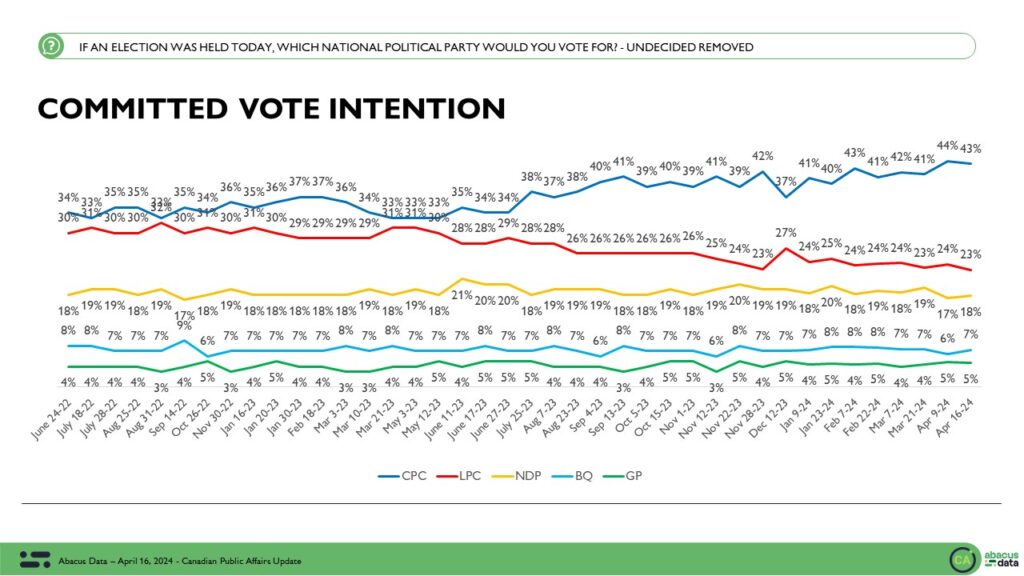
Regionally, the Conservatives are well ahead in the Prairies, lead by 22 in BC and 15 in Ontario. In Atlantic Canada, the Conservatives are 19-points ahead of the Liberals while in Quebec, the BQ is slightly ahead with the Conservatives and Liberals tied for second.
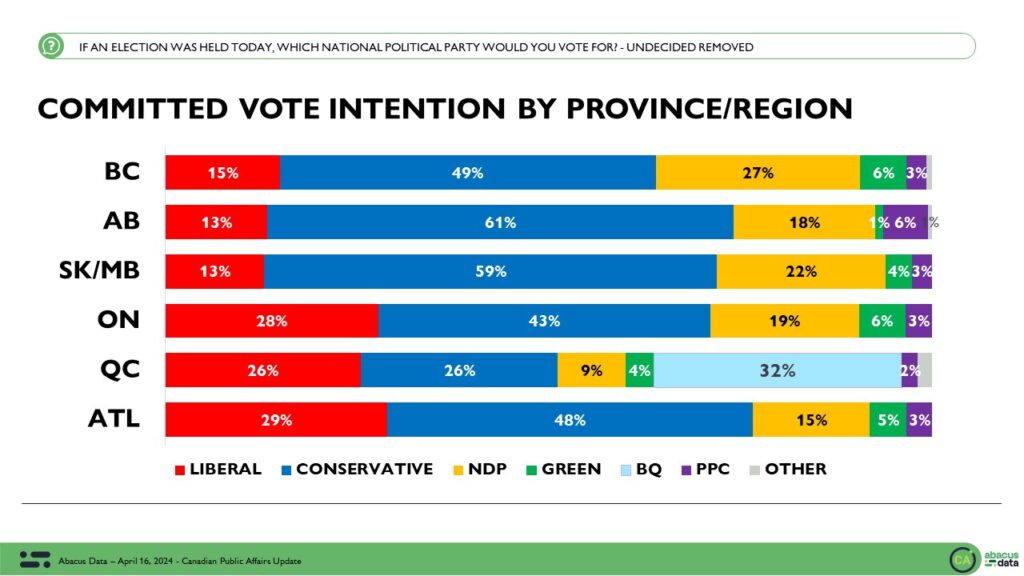
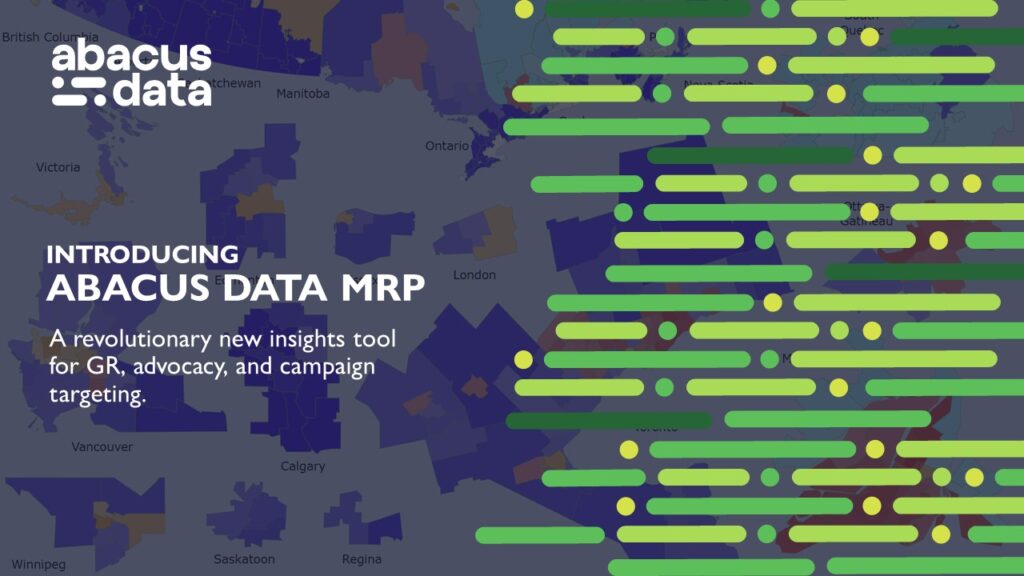
Demographically, the Conservatives lead among all age groups still. For the Liberals, there has been no real change in vote across any age group, specifically among younger Canadians – a key audience for the recent pre-budget announcements.
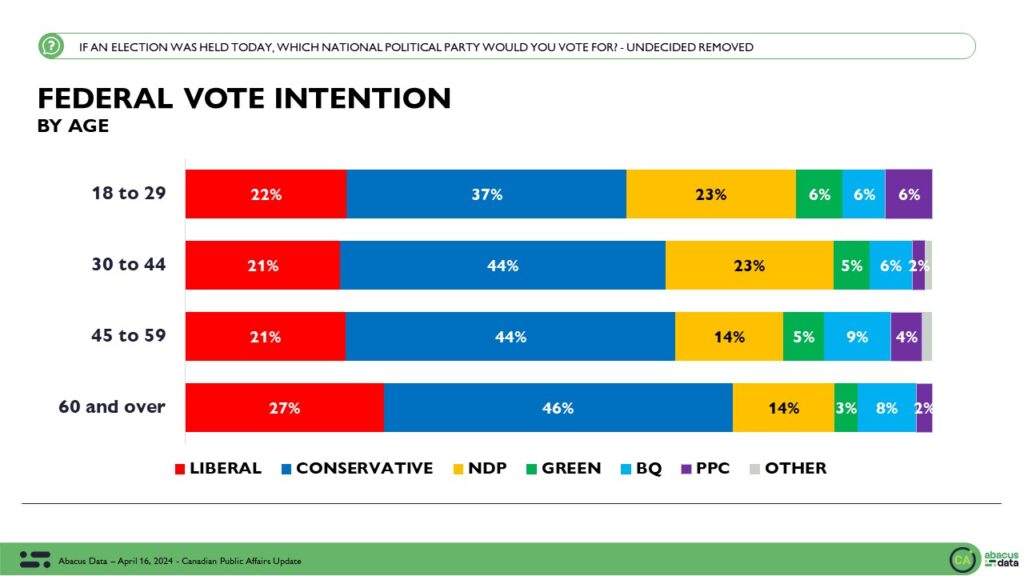
The Conservatives continue to capture a larger share of the vote among both men and women. The Conservatives lead by 25 among men and 16 among women.
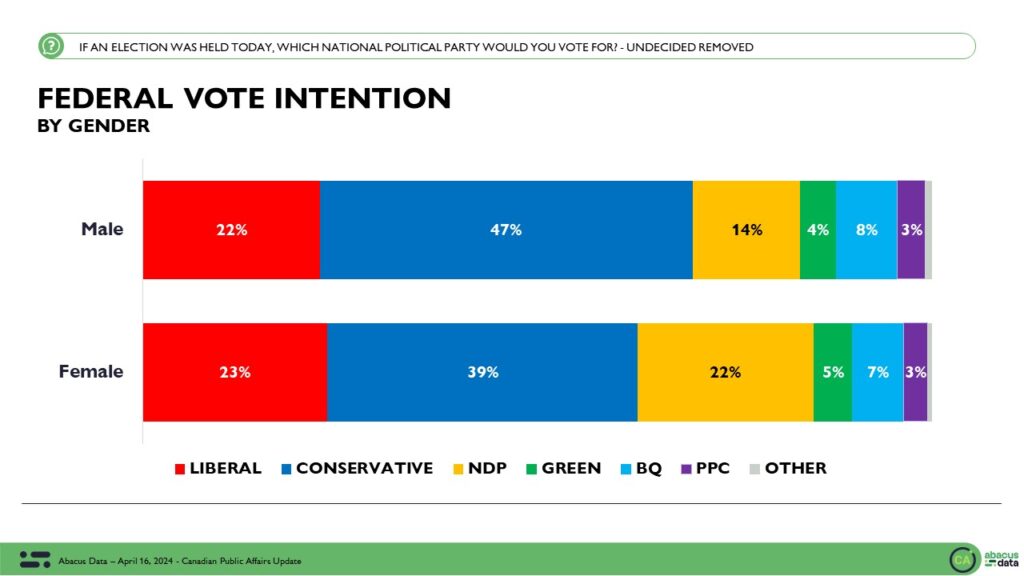
When we ask people if they would consider voting for each of the main political parties, 53% say they are open to voting Conservative (unchanged from last week) and 41% are open to voting Liberal (up one from last week).
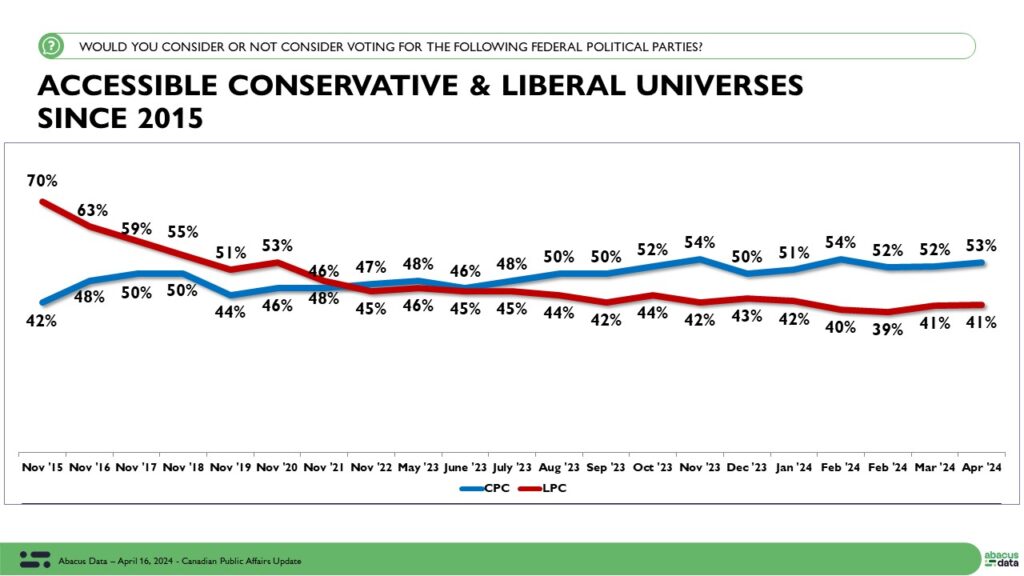

No major shifts in other metrics.
Beyond vote intention, the recent pre-budget announcements have not had any impact on other perceptions and impressions related to Canadian politics.
There has been no shift in perceptions about the direction of the country. The federal government’s approval rating has improved slightly with a 3-point drop in disapproval. And there’s been no shift in those who feel it’s time for a change in government.
KEY INSIGHT: Among 18 to 29 year olds, the 27% approve and 48% disapprove of the federal government’s job performance. Compared with the average over the first three months of 2024, approval is up 1 and disapproval is down 11. This is a noticeable decline in “disapproval” and might indicate some success in shifting views among younger Canadians.
Among older Canadians, we don’t see the equivalent shift in views.
Impressions of Justin Trudeau are static. 57% have a negative impression of the Prime Minister and 25% have a positive view for a net score of -32.
Among those aged 18 to 29, Trudeau’s net score is -30. The average for the first three months of 2024 was -36 so there has been a slight improvement.
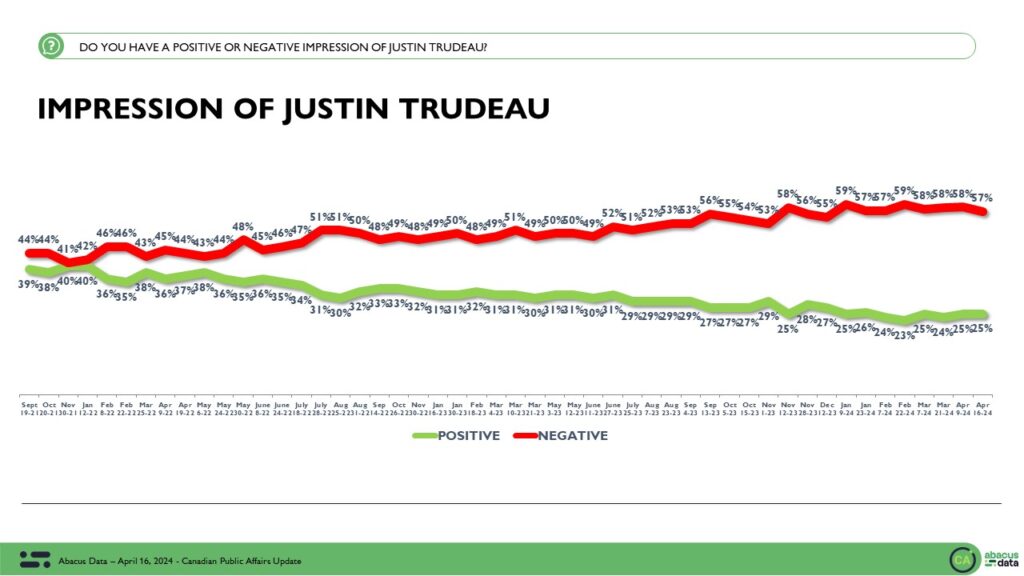
In contrast, impressions of Pierre Poilievre are also unchanged with 38% viewing him positively and 35% negatively for a net score of +3.
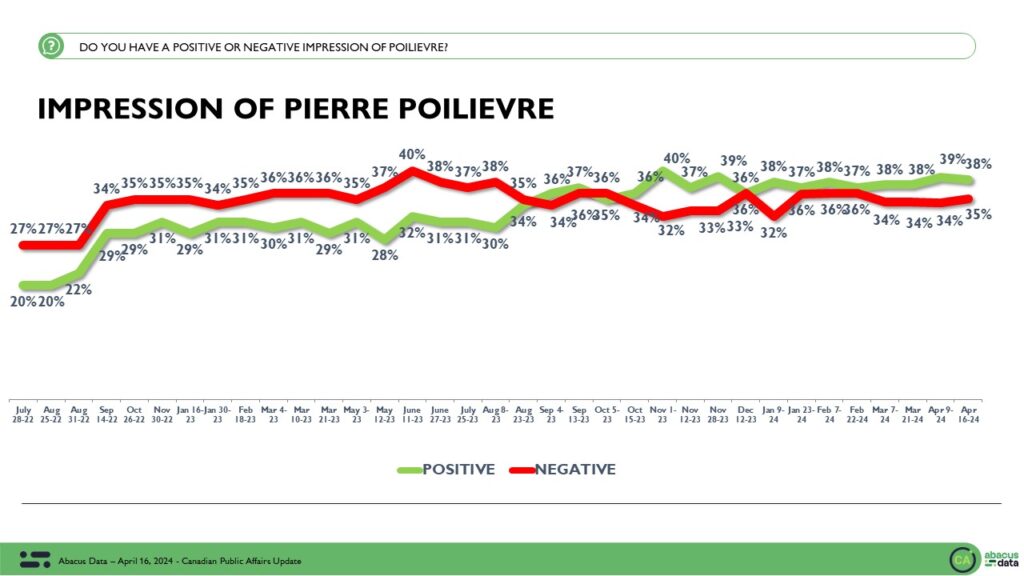
Feelings about NDP Leader Jagmeet Singh are also largely unchanged. Today 34% have a negative impression compared with 33% who have a positive one for a net score of -1.
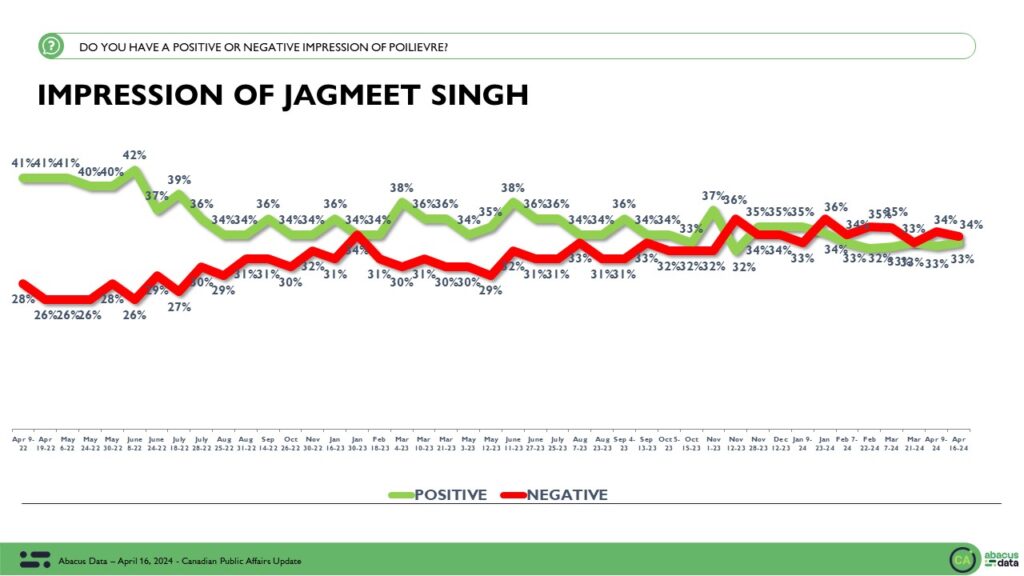
We also ask people whether their impression of each leader is getting better or worse over the past few weeks. Given the budget announcements were happening while this poll was in field, this is a good measure to capture whether any positive momentum was being generated by the announcements.
Overall, nothing has really changed from last week. 14% say their impression of Justin Trudeau is improving while 45% say it is getting worse. 41% say it is not changing. All of these measures are close to where they were last week.
KEY INSIGHT:
Among Canadians aged 18 to 29 (again a key audience of the pre-budget announcements), those who say their impression Trudeau are getting better is 17%. Those who say worse is 41%.
At the beginning of the month it was 16%/49%. And the average for the first three months of 2024 was 15%/42%. So in short, so far, budget announcements haven’t moved people to see the PM in a more positive light. Whether Tuesday’s formal budget announcement and the corresponding media coverage and outreach change that remains to be seen.
This is evidence that the announcements themselves haven’t translated into more positive impressions of the Prime Minister himself
.
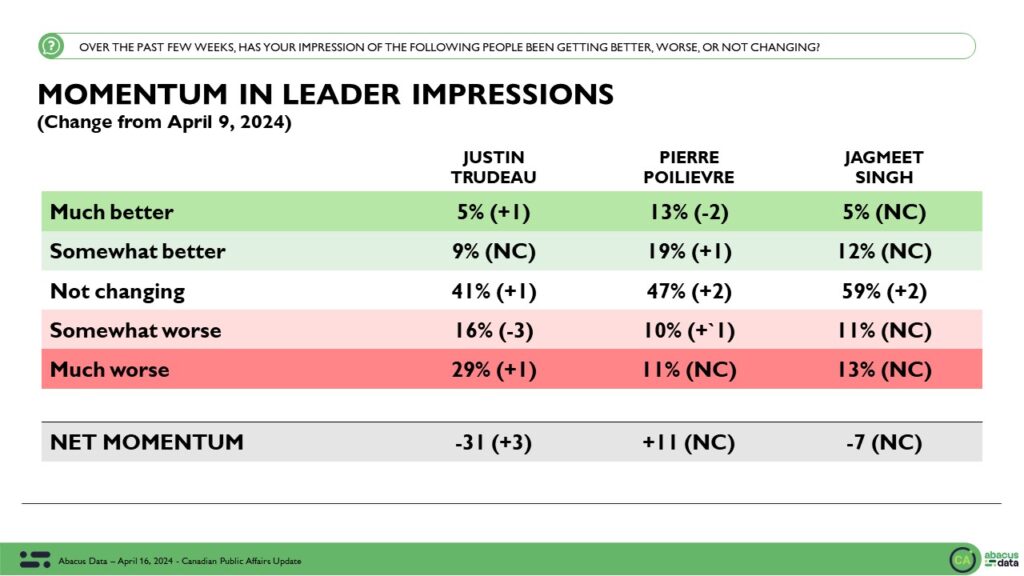

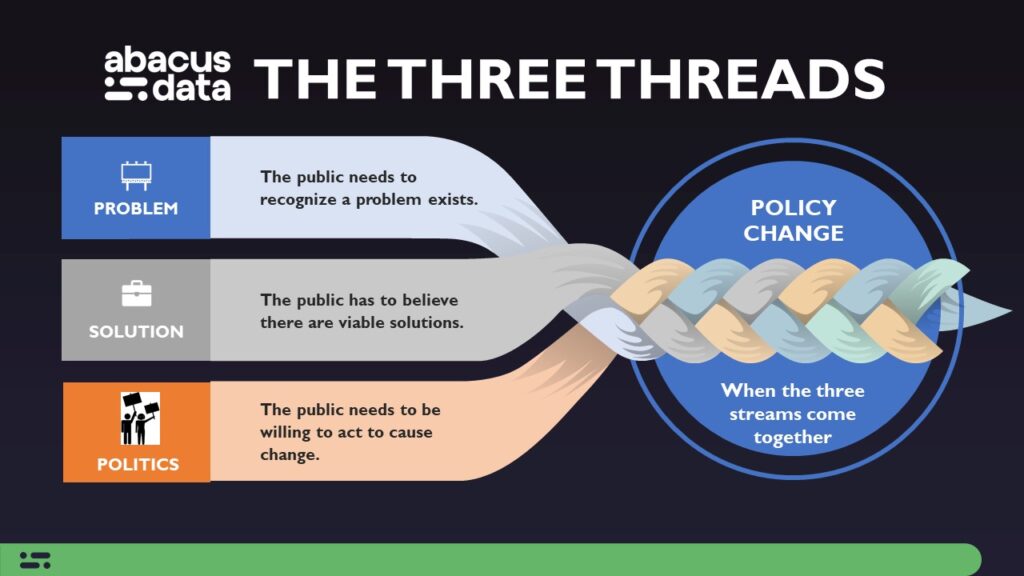
at polling for public affairs and advocacy.
Who would be better at…Hosting a Party or Putting out a Fire?
In this survey, we replicated what I thought were interesting questions asked by UK pollster JL Partners. We asked people which of Trudeau or Poilievre would be better at doing several things.
First, it is worth highlighting that, Canadians do distinguish between the leaders and many people didn’t simply pick the leader they like the most for each scenario.
The only scenario where Trudeau clearly beats Poilievre is on “hosting a party”. The two are tied on “holding a conversation at the pub”, “sitting next to you on a plane” and “looking after your children while you’re out.” While Poilievre easily beats the PM on “solving an escape room”, “being in charge of the map for the road trip”, “putting out a kitchen counter fire” and “putting up a shelf”
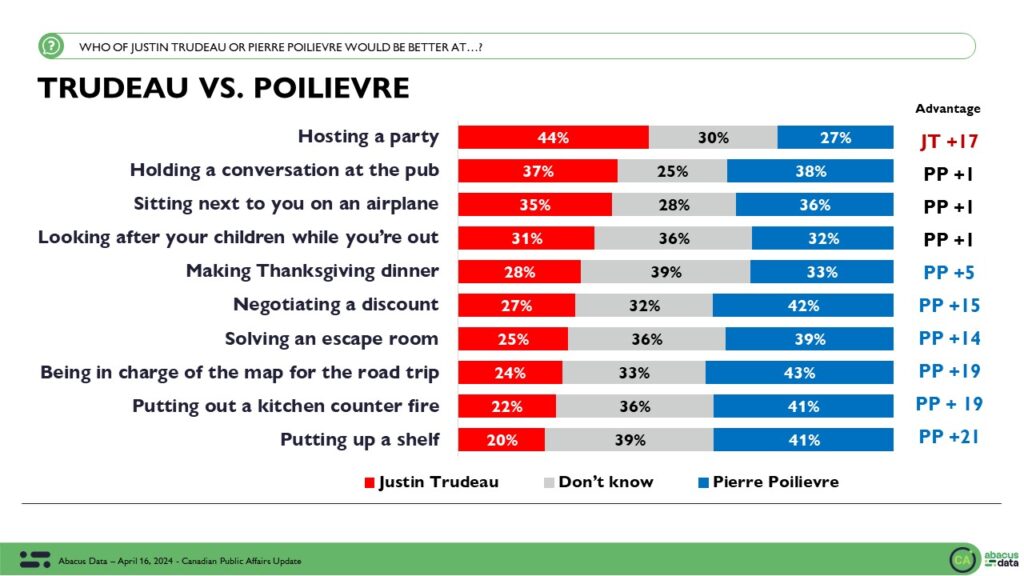
Among Liberal switchers (those who voted Liberal in 2021 but today are voting for another party or are undecided), Trudeau performs better (as expected) but Poilievre still leads among the more competency, back to basics, and leadership oriented scenarios (putting up a shelf, putting out a fire, being in charge of a map, negotiating a discount) while Trudeau has an advantage on the personality and trust scenarios like who these switchers would want to sit next to on a plane, have a chat with at a pub, or look after their children while they’re out.
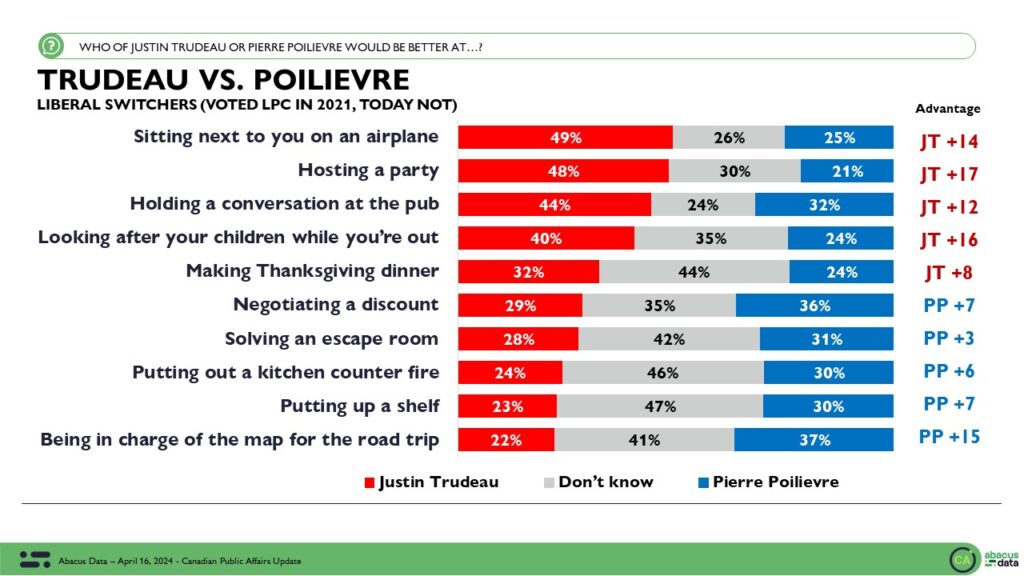
But perhaps most telling is how Gen Z and Millennials respond to this question.
Except for hosting a party, seatmate on a plane, and looking after children, Pierre Poilievre leads Trudeau on everything else. And on the competence scenarios, he leads by a wide margin.
KEY INSIGHT:
For two generations that found Mr. Trudeau so appealing in the past, the fact that Pierre Poilievre is competitive with him on the personality based scenarios is quite telling and shows just how damaged the relationship is between younger Canadians and Mr. Trudeau.
Poilievre leads Trudeau on “putting up a shelf” by 20, on “being in charge of the map for the road trip” by 24, on “putting out a kitchen counter fire” by 19, and by “solving an escape room” by 18.
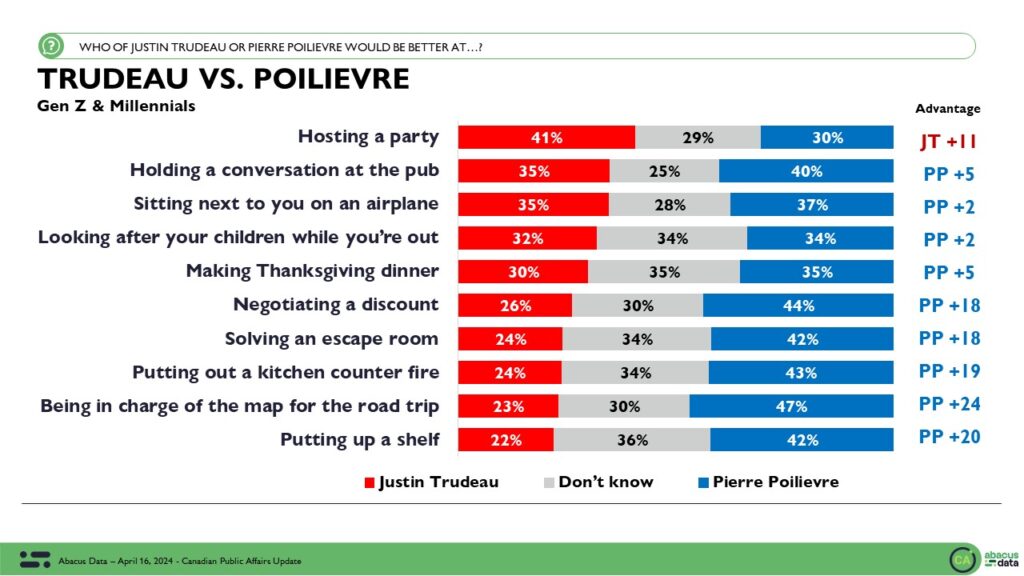
When I run correlation analysis between these perceptions and views and likelihood to vote Liberal and Conservative, we find four items better predict voting Conservative and Liberal than any other.
The top four scenarios to predict a vote for the Conservatives are:
Sitting next to you on a plane (it’s about likeability and comfort)
Being in charge of the map on the road trip (competence, leadership, focus)
Looking after your children while you’re out (trust)
Putting out a kitchen counter fire (competence in a crisis)
The top four scenarios to predict a vote for the Liberals are:
Sitting next to you on a plane
Being in charge of the map on the road trip
Solving an escape room
Putting out a kitchen counter fire
This all suggests that while Canadians might invite Prime Minister Trudeau to host their party, they’d likely prefer Pierre Poilievre to take the lead during a crisis or handle the logistics of a road trip.
KEY INSIGHT:
The differences in perceived abilities between Trudeau and Poilievre reflect a broader narrative about what qualities Canadians currently value in their leaders amid ongoing affordability issues and a seemingly perpetual crisis atmosphere. This once again confirms that right now, Canadians, including younger Canadians, are more likely to see Pierre Poilievre as a better fit for the times than Mr. Trudeau. This adds more evidence to my perspective that I didn’t think Justin Trudeau could win the next election.
The survey highlights two main areas of leadership qualities Canadians are emphasizing:
Crisis Management and Competence: Poilievre’s perceived superiority in handling practical tasks like extinguishing a kitchen fire or being in charge of a map resonates with a public desire for leaders who are not just thinkers but doers. This suggests that in times of constant challenge, from economic instability, a housing crisis, and general insecurity, Canadians are prioritizing decisive action and problem-solving skills. Things that right now people think the Prime Minister lacks or has proven unable to deliver right now..
Trust and Relatability: The factors associated with voting, such as sitting next to someone on a plane or looking after one’s children, underscore a longing for leaders who are not only capable but also trustworthy and personable. These characteristics suggest a leader’s ability to relate on a personal level, fostering a sense of safety and reliability. Given that Mr. Trudeau is competitive with Mr. Poilievre on these measures suggests some vulnerable for Mr. Poilievre on trust and relatability.
Ultimately, these two frames – Competence vs. Relatibility and Personal Trust – may become what the next federal election is about.
The Upshot
According to Abacus Data CEO David Coletto: “So far, we see no evidence that the flurry of pre-budget announcements have moved the dial for the Liberals.
In almost every measure we track, nothing has changed from a week ago – from perceptions of the direction of the country, to how people feel about the Prime Minister, to vote intention.
However, there is some evidence that younger Canadians may be responding to the annoucements. Whiles about the Prime Minister haven’t changed, those disapproving of the federal government’s performance is down 11 points. That’s a statistically significant shift likely caused by budget announcements that are clearly focused on generational fairness and speaking directly to younger Canadians.
We will see whether this muting of negatives leads to more positive impressions of the government. But for now, if you’re the Liberals, you’ll take this as some indication of success.
This survey also underlines a shift in public expectation where Canadians are seeking leaders who are not only visionary but are also pragmatic problem solvers. The contrasting perceptions between Trudeau and Poilievre, with the latter being seen as more adept in crisis scenarios and everyday challenges, mirror the electorate’s current inclination towards leaders who can navigate the turbulence of our times with competence and clear-cut effectiveness.”
Methodology
The survey was conducted with 2,300 Canadian adults from April 11 to 16, 2024. A random sample of panelists were invited to complete the survey from a set of partner panels based on the Lucid exchange platform. These partners are typically double opt-in survey panels, blended to manage out potential skews in the data from a single source.
The margin of error for a comparable probability-based random sample of the same size is +/- 2.0%, 19 times out of 20.
The data were weighted according to census data to ensure that the sample matched Canada’s population according to age, gender, educational attainment, and region. Totals may not add up to 100 due to rounding.
This survey was paid for by Abacus Data Inc.
Abacus Data follows the CRIC Public Opinion Research Standards and Disclosure Requirements that can be found here: https://canadianresearchinsightscouncil.ca/standards/
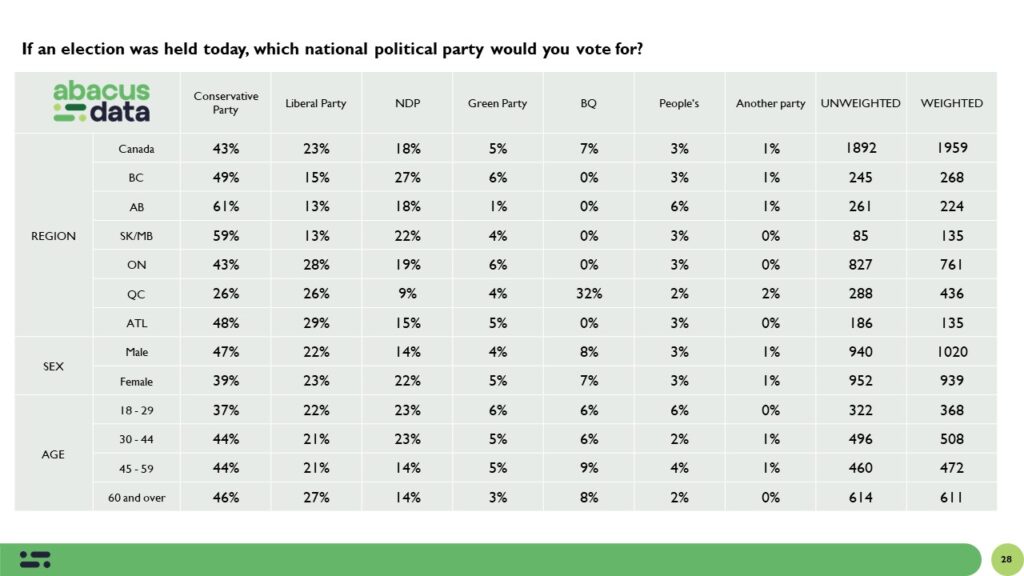
ABOUT ABACUS DATA
We are Canada’s most sought-after, influential, and impactful polling and market research firm. We are hired by many of North America’s most respected and influential brands and organizations.
We use the latest technology, sound science, and deep experience to generate top-flight research-based advice to our clients. We offer global research capacity with a strong focus on customer service, attention to detail, and exceptional value.
And we are growing throughout all parts of Canada and the United States and have capacity for new clients who want high quality research insights with enlightened hospitality.
Our record speaks for itself: we were one of the most accurate pollsters conducting research during the 2021 Canadian election following up on our outstanding record in the 2019, 2015, and 2011 federal elections.
Contact us with any questions.
Find out more about how we can help your organization by downloading our corporate profile and service offering.




